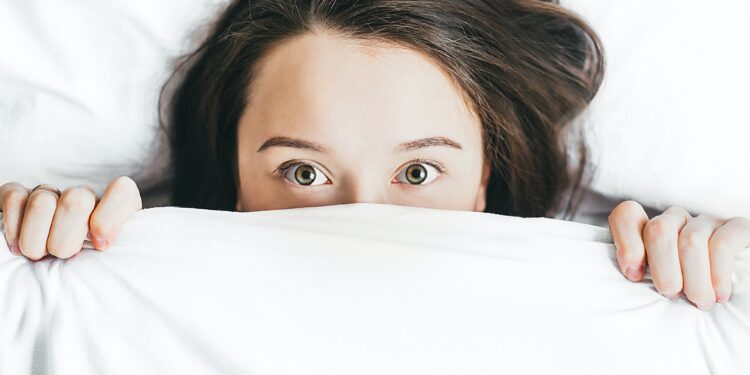Sleep hygiene plays a crucial role in maintaining good mental well-being. Poor or imperfect sleep hygiene practices can disrupt the normal balance of the sleep-wake cycle and have significant associations with sleep problems, daytime sleepiness, and depression. Factors such as circadian rhythm, sleep debt, sleep disorders, and environmental and behavioral habits all influence the quality of sleep we get.
Detrimental effects of poor sleep hygiene on mental health!
Poor sleep hygiene can have a detrimental impact on mental health. When we consistently fail to prioritize and practice good sleep habits, it can lead to a range of mental health issues. Sleep deprivation and disrupted sleep patterns have been linked to increased levels of stress, anxiety, and even mood disorders such as depression. This is because quality sleep is vital for the brain’s ability to regulate emotions and process information effectively.
Poor sleep can exacerbate existing mental health conditions and make it more challenging to cope with daily stressors. It can also affect cognitive functioning, impairing our ability to concentrate, make decisions, and solve problems. Over time, these effects can have long-lasting consequences on our mental well-being.
Creating a conducive sleep environment is an essential component of good sleep hygiene. It involves setting up your bedroom in a way that promotes relaxation and restful sleep.
One key consideration is the lighting in your bedroom. Make sure to create a dark and quiet environment, as excessive light and noise can disrupt your sleep. Invest in blackout curtains or wear an eye mask to block out any unwanted light. Similarly, consider using earplugs or a white noise machine to drown out any distractions.
Another important factor to consider is the temperature of your bedroom. The ideal sleeping temperature is generally between 60 and 67 degrees Fahrenheit (15-19 degrees Celsius). Experiment with different thermostat settings and bedding materials to find what works best for you.
Also, keeping your bedroom clean and clutter-free can contribute to a better sleep environment. Remove any electronic devices, such as smart phones or tablets that emit blue light and can interfere with your sleep. It’s best to establish a no-screen policy at least an hour before bedtime.
In addition to creating a sleep-friendly environment, establishing a consistent sleep schedule is crucial for maintaining optimal mental well-being. Our bodies have an internal clock, known as the circadian rhythm, which regulates our sleep-wake cycle. When we have a regular sleep routine, our bodies become accustomed to falling asleep and waking up at the same time each day.
By adhering to a consistent sleep schedule, we are training our bodies to be more efficient at sleeping, which can lead to a higher quality of rest. In turn, this can have a positive impact on our mental wellness and overall cognitive functions.
To establish a consistent sleep schedule, it’s important to set a bedtime and wake-up time that allows for the recommended seven to nine hours of sleep for adults. Consistency is key, so try to stick to this schedule even on weekends and holidays.
While a consistent sleep schedule is essential for establishing good sleep hygiene, incorporating relaxation techniques into your bedtime routine can further enhance the quality of your sleep and contribute to your overall mental well-being.
Engaging in relaxation techniques before bed can help reduce stress and promote a sense of calmness, making it easier for you to fall asleep and stay asleep throughout the night. Some effective relaxation techniques include deep breathing exercises, progressive muscle relaxation, meditation, and guided imagery.
- Deep breathing exercises involve taking slow, deep breaths, focusing on your breath as you inhale and exhale. This simple yet powerful technique can help relax both your body and mind, preparing you for a restful sleep.
- Progressive muscle relaxation involves systematically tensing and then releasing different muscle groups in your body. By consciously and intentionally relaxing each muscle group, you can release tension and promote a deep state of relaxation.
- Meditation and guided imagery are practices that involve clearing your mind of racing thoughts and redirecting your focus to a specific image, sound, or mantra. These practices can help calm your mind and induce a state of relaxation, supporting a restful night’s sleep.
Incorporating these relaxation techniques into your bedtime routine can provide a natural and drug-free way to improve your sleep quality and enhance your mental well-being. By dedicating just a few minutes each night to these practices, you can create a peaceful and serene atmosphere that promotes a sound and rejuvenating sleep.
The pervasive use of technology in our daily lives has transformed the way we live, work, and connect with others. However, when it comes to sleep hygiene and mental well-being, technology might not always be our ally. Research has shown that exposure to the blue light emitted by screens such as smart phones, tablets, and laptops can disrupt our sleep patterns and hinder our ability to achieve restful sleep.
The constant availability of information and the allure of social media can also keep our minds engaged and alert, making it harder to wind down and relax before bedtime. Moreover, the habit of checking our devices right before sleep can inhibit our ability to disconnect and create a stress-free environment that is conducive to quality sleep.
Seek professional help for persistent sleep issues!
If you’ve tried implementing various strategies to improve your sleep hygiene and still find yourself struggling with persistent sleep issues, it might be time to seek professional help. Consulting with a healthcare professional, such as a sleep specialist or a therapist, can provide valuable insights into the underlying causes of your sleep disturbances and help you develop a more targeted approach to addressing them.
A sleep specialist can conduct a thorough evaluation of your sleep patterns and recommend evidence-based treatments, such as cognitive-behavioral therapy for insomnia (CBT-I) or medication if necessary. They can also provide guidance on developing healthy sleep habits and creating a conducive sleep environment.
Similarly, a therapist can assist you in exploring any psychological factors that could be contributing to your sleep difficulties. They can help you identify and address stressors or emotional concerns that may be keeping you up at night, utilizing techniques such as relaxation exercises, mindfulness, or talk therapy.
Remember, seeking professional help is not a sign of weakness, but a proactive step towards taking control of your mental well-being. Don’t hesitate to reach out if you find that your sleep issues persist despite your efforts to improve your sleep hygiene. Your overall health and happiness deserve the attention and care they require.
Prioritizing sleep hygiene is truly a gift you can give yourself for the sake of your mental well-being. Taking steps to improve your sleep hygiene can have a profound impact on your overall health and happiness. By implementing strategies such as maintaining a consistent sleep schedule, creating a relaxing bedtime routine, and optimizing your sleep environment, you are setting yourself up for restful nights and productive days.
However, if you find that your efforts are not yielding the desired results, don’t hesitate to seek professional help. Consulting with a sleep specialist or therapist can provide valuable insights and tailored treatment options to address the underlying causes of your sleep disturbances. Remember, reaching out for professional help is a proactive step towards taking control of your mental well-being and should not be seen as a sign of weakness.















